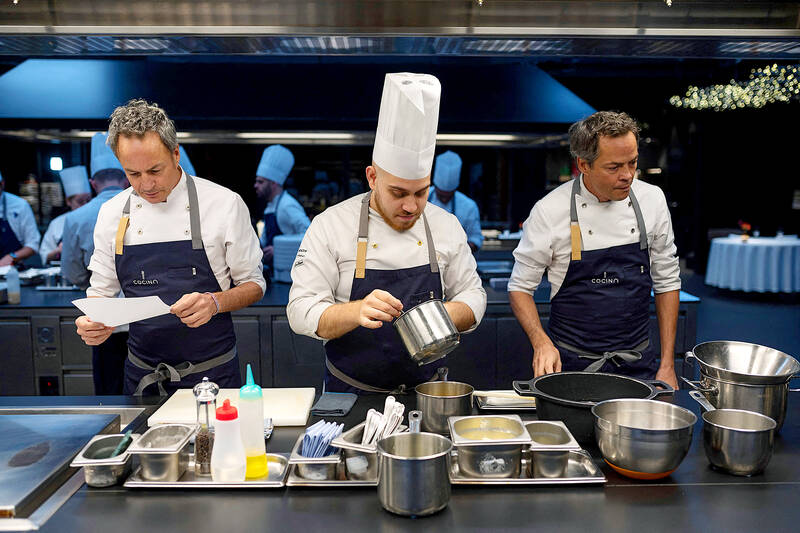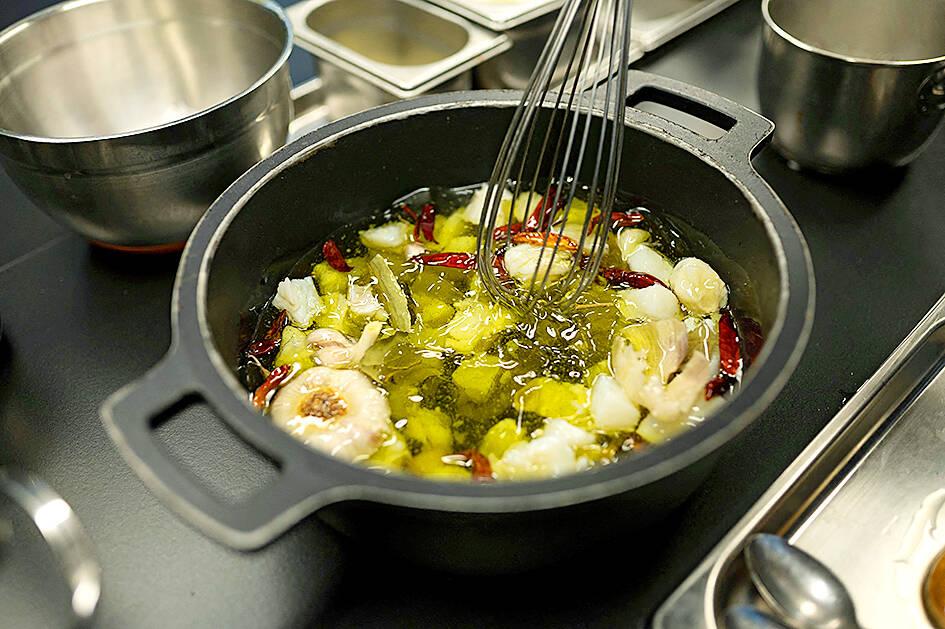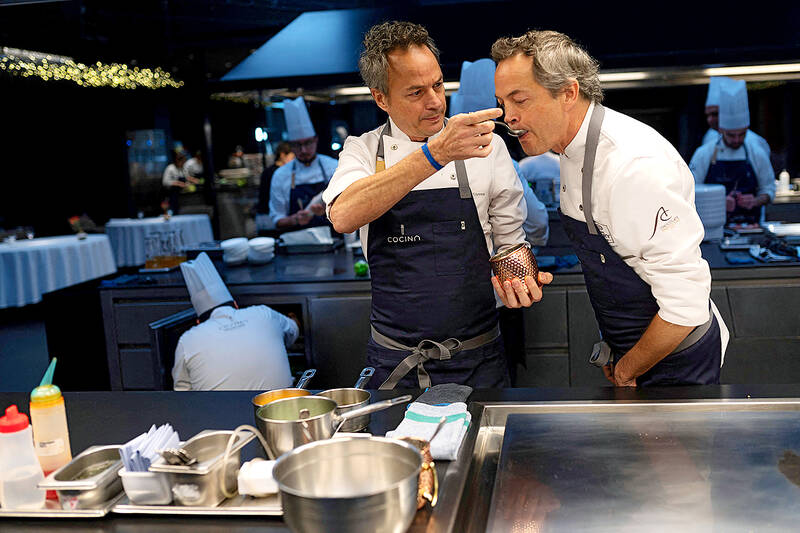When they were just eight years old, Spanish twins Sergio and Javier Torres set a goal: they wanted to become chefs who were among the top in their field. To achieve this they strategically split up to get training in different esteemed kitchens around the world, published books on cooking and presented a popular TV show.
The plan worked.
Over four decades after they surprised their family by saying they wanted to be chefs, Sergio and Javier’s Barcelona restaurant, Cocina Hermanos Torres, was awarded a third Michelin star last month.

Photo: AFP
“We developed a plan, that I think is a perfect plan,” a smiling Javier, 51, said at the restaurant, one of only 13 in Spain and Portugal with the top three-star ranking from the prestigious French guide.
“When we started to go out of Barcelona we thought that Sergio would take one path, I would take another, and we would never coincide until we were ready,” he added.
The journey took the twins — who grew up in a working class Barcelona neighborhood — to different elite restaurants in Spain, Switzerland and France. Before moving to Paris where he worked with top French chef Alain Ducasse, Sergio spent two years at the award-winning Le Jardin des Sens in Montpellier which is also run by twins — Jacques and Laurent Pourcel.

Photo: AFP
“We were separated but every month we met up in a restaurant, ate well, we spent the little money we had and developed the next steps of our strategy,” said Sergio as sat beside his brother.
GRANDMOTHER INFLUENCE
Each brother specialized in different areas — one learned to cook meat and vegetables, the other fish and bread, he added.

Photo: AFP
Both siblings credit their grandmother for their passion for cooking. She was part of a wave of people who moved from the southern region of Andalusia to the more industrialized Catalonia in the northeast in search of better life following Spain’s devastating 1936-39 civil war.
“Our grandmother looked after us, and since she was in the kitchen all day we literally grew up in a kitchen,” said Sergio.
After earning two Michelin stars with their previous project “Dos Cielos” and becoming familiar faces thanks to their participation in a cooking show, they decided to open Cocina Hermanos Torres in 2018.
The twins visited some 200 possible locations before settling on an industrial building near Barcelona’s iconic Camp Nou football stadium.
They invested nearly three million euros to convert it into the restaurant, which seats a maximum of 50 people in tables with no wall separating them from the three work stations were staff prepare meals.
“We wanted to reflect what we experienced in our childhood, which was a kitchen and a table, and everyone around the table,” said Javier.
‘DIFFICULT ROAD’
The tasting menu costs 255 euros (US$265), with another 160 euros if it is paired with wine, a stiff price in a country where the monthly minimum wage is around 1,000 euros.
Praised for its creative and playful cuisine, among the dishes served is cured squid with poultry broth and an onion soup with Parmesan cheese and truffles.
“You will experience flavors that you have never experienced before, because you will discover a cuisine where you will like what you don’t like,” said Sergio.
On a recent visit at noon 50 staff members — many of them young — are busy at work finalizing details before customers arrive.
“It seems like today a chef is like a ‘super star’. It’s a very difficult road, very difficult, with long hours and it’s very hard to make it, it takes tremendous perseverance,” said Sergio.
“You have to risk it, go for broke, give it your all, because if you don’t, you are not living,” he added with a smile.

June 9 to June 15 A photo of two men riding trendy high-wheel Penny-Farthing bicycles past a Qing Dynasty gate aptly captures the essence of Taipei in 1897 — a newly colonized city on the cusp of great change. The Japanese began making significant modifications to the cityscape in 1899, tearing down Qing-era structures, widening boulevards and installing Western-style infrastructure and buildings. The photographer, Minosuke Imamura, only spent a year in Taiwan as a cartographer for the governor-general’s office, but he left behind a treasure trove of 130 images showing life at the onset of Japanese rule, spanning July 1897 to

One of the most important gripes that Taiwanese have about the Democratic Progressive Party (DPP) is that it has failed to deliver concretely on higher wages, housing prices and other bread-and-butter issues. The parallel complaint is that the DPP cares only about glamor issues, such as removing markers of Chinese Nationalist Party (KMT) colonialism by renaming them, or what the KMT codes as “de-Sinification.” Once again, as a critical election looms, the DPP is presenting evidence for that charge. The KMT was quick to jump on the recent proposal of the Ministry of the Interior (MOI) to rename roads that symbolize

On the evening of June 1, Control Yuan Secretary-General Lee Chun-yi (李俊俋) apologized and resigned in disgrace. His crime was instructing his driver to use a Control Yuan vehicle to transport his dog to a pet grooming salon. The Control Yuan is the government branch that investigates, audits and impeaches government officials for, among other things, misuse of government funds, so his misuse of a government vehicle was highly inappropriate. If this story were told to anyone living in the golden era of swaggering gangsters, flashy nouveau riche businessmen, and corrupt “black gold” politics of the 1980s and 1990s, they would have laughed.

In an interview posted online by United Daily News (UDN) on May 26, current Chinese Nationalist Party (KMT) Chairman Eric Chu (朱立倫) was asked about Taichung Mayor Lu Shiow-yen (盧秀燕) replacing him as party chair. Though not yet officially running, by the customs of Taiwan politics, Lu has been signalling she is both running for party chair and to be the party’s 2028 presidential candidate. She told an international media outlet that she was considering a run. She also gave a speech in Keelung on national priorities and foreign affairs. For details, see the May 23 edition of this column,